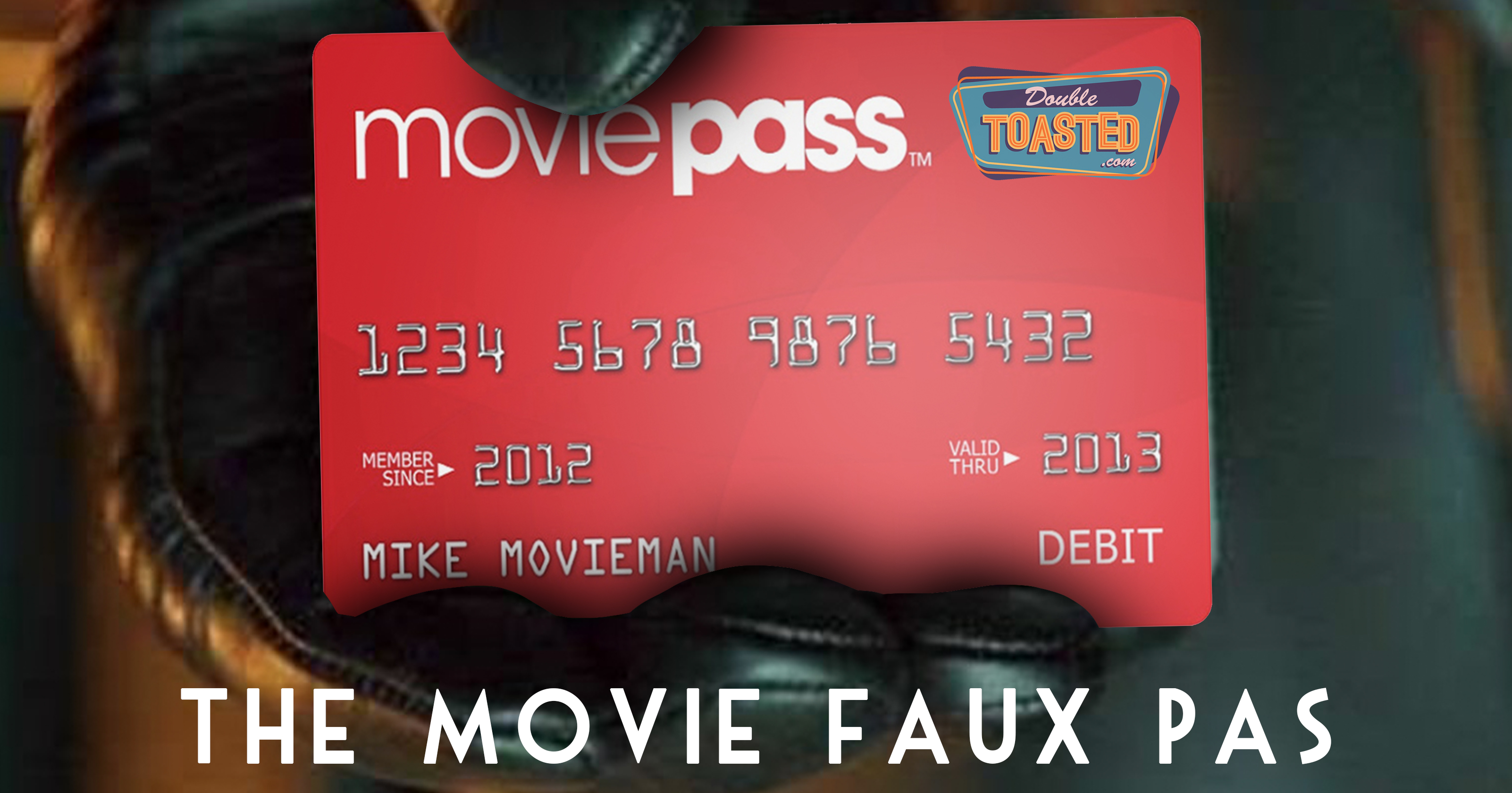Will’s Honest Opinion – The Movie Faux Pas – 1-9-17

In what appears to be a case of something being way too good to be true, MoviePass has hit the scene like a bat out of hell (on it’s way to the latest Marvel flick). In instances like these, the question inevitably arises about the longevity of such an endeavor. I remember when Netflix came out, and it almost seemed like the business model itself was unsustainable. Netflix now boasts over 99 million subscriptions; and to follow suit, MoviePass announced today that they have over 1.5 million users. A monthly subscription that pays for itself after only one use seems a bit like a scam to many; as well it should. But is it? I’ve been using the card for over two months now with the new locked in $10 a month rate, and these are my findings.
Less then a month after I signed up I received an email from MoviePass offering a discounted rate with a one time annual fee of $70 instead of the $10 monthly expense I previously agreed to. I found this to be highly suspect. What if they’re not around in 6 months? Then I would have forfeited over possibly $40 or $50 bucks instead of only being charged for the months I used it. It made me question MoviePass’ projected earnings and future success; that is until I realized who was truly benefiting from this. Hint: It’s not MoviePass directly…
To begin, this may actually be a better deal for studios than their consumers. Imagine the service is akin to a gym membership. I bought my Planet Fitness membership 8 years ago for $10 a month. I go maybe 4 months a year, but it’s nice knowing I can go whenever I want. To me the service is worth the price due to my infrequency of use. Now if I was to spend on average $75 a month on a gym membership, I feel I would need to move into that place to make my subscription worth that price. I don’t go every single day, so such a high entrance fee is anything but nominal.
Originally MoviePass offered unlimited movies for $40 a month. But is “unlimited” truly unlimited? If the average ticket price is $10, this averages out to one movie per week. But that price is still a bit steep. Cinephile or not, frequenting a theater once a week for non-critics and casual movie-goers isn’t realistic. But with the price lowered to $10 a month, that’s a guaranteed $120 annual profit that the studios get a cut of regardless of audience attendance. Will the average consumer spend $120 a year on movie tickets? Maybe, maybe not. But those who go, make up for those who don’t. And for those who go possibly once a month or so, it’s still worth having the MoviePass for the convenience of going whenever they want.
Right now, it’s not hard to find a million articles telling you how to use your MoviePass to it’s full potential, or how movie studios are shaking in their boots because of possible revenue loss incurred by the red plastic card. The Verge posted an article last month with the headline: “Theater Chains are Terrified of MoviePass Because of People Like Me.” To cut to the chase, this is total bullshit. These theaters thrive off of articles like these, because they want their consumers to think they’re gaming the system. What they won’t tell you is that once through the door, with a minimal entrance fee, patrons are now more likely to buy popcorn, soda and candy on site because of the perceived ticket discount. This is a revenue stream not shared with studios. That’s now all cash being directly funneled into AMC, and Galaxy, etc etc. Movie theaters are not movie theaters. They’re candy stores.
Let’s also be real for a minute. Yes you can go to one movie a day for a month, but will you? Could you even do it? The terms and conditions state that you can’t see more than one movie per day. So the possibility of abusing the system becomes difficult because on average no more than three new movies are released per week; so even at full force, you wouldn’t be able to see 30 movies in a month unless you wanted to see the same ones over and over. Which brings us to our next point; the issue of timing.
It’s no secret that January is a dumping ground for studios. It’s when they unload their shelved garbage and begin to prep for their summer lineup. MoviePass making it’s big foray into public consciousnesses now is an odd choice. It doesn’t have the backing of a guaranteed knock-out summer programming schedule to rely on. Granted, I purchased my card early enough that I was able to see ‘Thor’, ‘Justice League’, and ‘The Last Jedi’ with it, but even for studio blockbusters, those were all oddly timed releases. Historically those three movies would be guaranteed summer fare. This month so far I’ve only used it to see ‘All the Money in the World’… and maybe I’ll see ‘Downsizing’..? Neither movie I could in all honestly tell you I would have paid to see in theaters in the past. Those are both by definition, a Netflix/HBO offering to me. But I went because I could. Meaning what exactly? For the consumers it’s not a great time to purchase the card but it’s money in the bank for the studios.
In fact, you could make the argument that MoviePass is the win the studios need right now, and desperately so. The line-up for 2018 is bleak. Now this doesn’t take into account the possibility of sleeper hits lying dormant until their release date. We’re all waiting with baited breath for the next ‘Get Out’ or ‘Baby Driver’, but as far as anticipated big budget blockbusters go, there’s like 4 in the queue? Maybe? This is a pretty paltry offering compared to the last few years.
It’s no secret the overdue Superhero Film Franchise collapse is closing in. DC doesn’t have anything really interesting coming out this year. I mean ‘Aqua-man’ might be tremendous, but I would never consider paying to see it. ‘Justice League’ soured me so badly that it made me want to swear off all new DC films. And I liked ‘Batman vs Superman’!!! And this is why MoviePass is the right service at the right time…for the studios; not for general audiences.
People are just not going to the movies like they used to. And with VOD and DTO, why would they?
Recently we had to play the world’s smallest violin for the film industry as another report surfaced that Hollywood had it’s worst fiscal year in over two decades. 2017’s ticket sales were the lowest anyone had seen since 1992. By 1994, the film industry would begin to find a way out of it’s rut. It also had one of the biggest human interest stories ever to hit households. As a way to break the ice with it’s millions of viewers, TV stations brought the Tonya Harding/Nancy Kerrigan rivalry directly into their living rooms. Now, in 2018, as a way to get assess back in seats, the same story is being told over a quarter of a century later with: ‘I, Tonya’. The comparison may seem silly, until you realize that the only reason a huge subset of movie goers even saw “I, Tonya” was because they used their MoviePass to do it. Begging the question, who’s really the ones getting their legs snapped here?
-Will Valle




